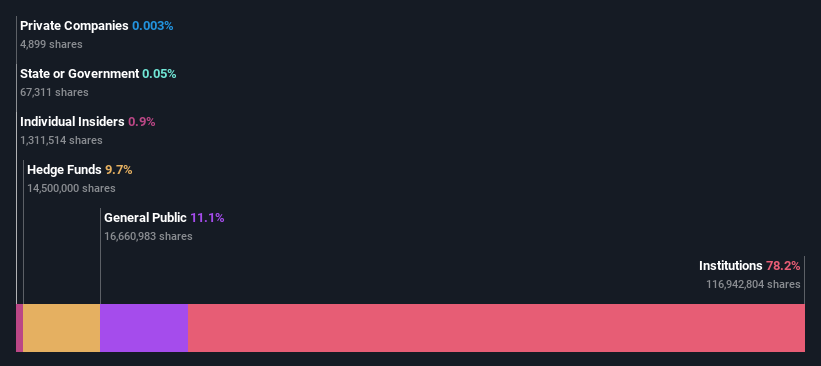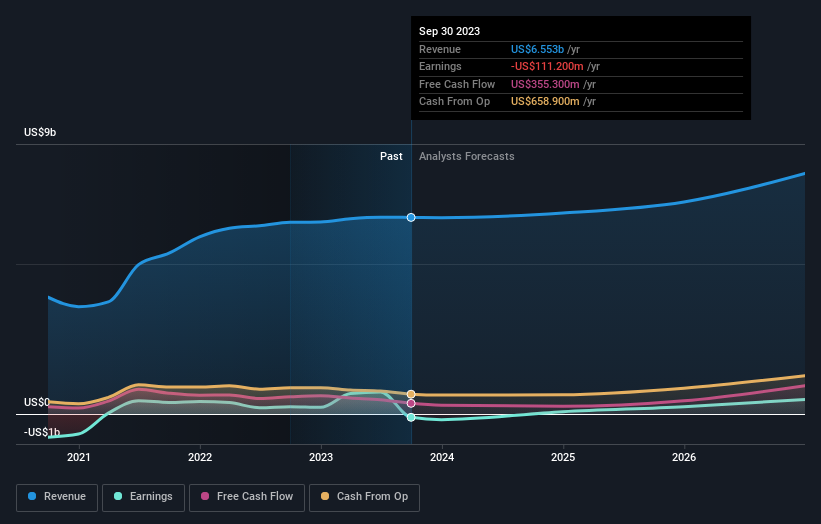Key ideas
- Given institutions' large stake in the stock, PENN Entertainment's stock price could be vulnerable to their business decisions.
- The top 9 shareholders own 52% of the company
- Recent Insider Buying
Each investor in PENN Entertainment, Inc. (NASDAQ:PENN) must know the most powerful groups of shareholders. And the group that holds the biggest share of the pie is institutions with a 78% stake. In other words, the group faces maximum upside potential (or downside risk).
Institutional investors would welcome the 3.7% rise in the stock price over the past week, given their year-over-year losses total a disappointing 12%.
Let's take a closer look at each PENN Entertainment owner type, starting with the table below.
See our latest analysis for PENN Entertainment

What does institutional ownership tell us about PENN Entertainment?
Institutional investors typically compare their own returns to those of a commonly followed index. They therefore generally consider buying larger companies included in the relevant benchmark index.
PENN Entertainment already has institutions listed on the share registry. Indeed, they own a respectable stake in the company. This suggests a certain credibility among professional investors. But we can't rely on that fact alone, because institutions make bad investments sometimes, just like everyone else. If multiple institutions change their views on a stock at the same time, the stock price could fall quickly. So it's worth checking out PENN Entertainment's earnings history below. Of course, it's the future that really matters.

Since institutional investors own more than half of the issued shares, the board will likely need to pay attention to their preferences. It appears that hedge funds own 9.7% of PENN Entertainment shares. This is interesting, because hedge funds can be very active and activist. Many look for medium-term catalysts that will drive the stock price higher. The Vanguard Group, Inc. is currently the company's largest shareholder with 9.8% of the shares outstanding. As a reminder, the second largest shareholder owns approximately 9.7% of the outstanding shares, followed by a 9.0% stake by the third largest shareholder.
We also observed that the top 9 shareholders account for more than half of the share register, with a few smaller shareholders to balance the interests of the larger ones to some extent.
While studying institutional ownership for a company can add value to your research, it is also a good idea to research analyst recommendations to get a deeper understand of a stock's expected performance. There are plenty of analysts covering the stock, so it might be interesting to see their forecasts as well.
Insider ownership of PENN Entertainment
Although the precise definition of an insider can be subjective, almost everyone considers board members to be insiders. Company management runs the business, but the CEO will answer to the board of directors, even if he or she is a member of it.
Most view insider ownership as positive because it can indicate that the board is well aligned with other shareholders. However, sometimes too much power is concentrated within this group.
Our most recent data indicates that insiders own less than 1% of PENN Entertainment, Inc.. Keep in mind that this is a large company, and insiders own US$34m worth of shares. The absolute value could be more important than the proportional share. Perhaps just as important is taking into account recent purchases and sales. You can click here to see if insiders have been buying or selling.
General public property
With an 11% stake, the general public, consisting mainly of individual investors, has some influence over PENN Entertainment. While this group can't necessarily call the shots, they can certainly have a real influence on how the company is run.
Next steps:
I find it very interesting to know who exactly owns a company. But to really understand better, we need to consider other information as well. For example, we identified 1 warning sign for PENN Entertainment which you should be aware of.
But finally it's the futureThis is what will determine the success of the owners of this business, not the past. This is why we think it is advisable to take a look at this free report showing whether analysts are predicting a better future.
NB: The figures in this article are calculated using data for the last twelve months, which refers to the 12 month period ending on the last day of the month in which the financial statements are dated. This may not be consistent with the annual report figures for the entire year.
The assessment is complex, but we help to simplify it.
Find out if PENN Entertainment is potentially overvalued or undervalued by viewing our full analysis, which includes fair value estimates, risks and warnings, dividends, insider trading and financial health.
Any feedback on this article? Worried about the content? Get in touch with us directly. You can also email the editorial team (at) Simplywallst.com.
This Simply Wall St article is general in nature. We provide commentary based on historical data and analyst forecasts only using unbiased methodology and our articles are not intended to constitute financial advice. It does not constitute a recommendation to buy or sell shares and does not take into account your objectives or your financial situation. Our goal is to provide you with targeted, long-term analysis based on fundamental data. Note that our analysis may not take into account the latest price-sensitive company announcements or qualitative material. Simply Wall St has no position in any stocks mentioned.

